
In this edition of Meet The Need NC eNews:
- Message from LAND, the Backbone of Meet The Need NC
- January Lunch & Learn Wrap Up: I/DD and the School System: Building the Foundation for Successful Community Inclusion
- Register for February’s Webinar: Meet the Need NC Learning Community: Part 1 – Policy Think Tank
- LENS: Lived Experience Network Speaks Blog
- Policy Updates and Other News
- Meet the Need NC wishes you a Happy New Year!
- Let’s get social! Stay in touch with us on Facebook, Instagram and more!
Message from LAND, the Backbone of Meet the Need NC
Transforming the I/DD LANDscape in North Carolina
If community inclusion is a choice for those with intellectual or other developmental disabilities (I/DD) and their families into adulthood, we should begin conversations with all parents and individuals much earlier.
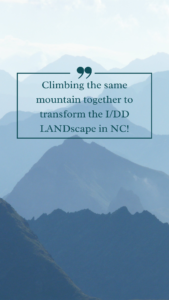
At our recent webinar, “The Role of K-12 Schools in Building the Foundation for Community Inclusion,” we looked at the need for systemic change to help create a clearer pathway to inclusion in communities for those with I/DD. We find schools to be a ready vehicle for influencing attitudes and information sharing regarding inclusion in general for historically marginalized populations, including those with disabilities.
We explored the hypothesis that changing attitudes and being better informed around community inclusion earlier in the lives of individuals could equal increased opportunities for community inclusion in living and working throughout adulthood. Helping others outside of our I/DD Community become more I/DD-informed is essential to meet the service and support needs of our I/DD Community in North Carolina. This includes policymakers, school staff, healthcare professionals, neighbors, our extended families and so many more.
At the heart of being I/DD-informed is a person-centered approach that teaches “no one size fits all.” During our January webinar, we used an example of a program called Charting the LifeCourse to illustrate this point. It is just one framework to illustrate the importance of looking across the life cycle and life domains to help create a path toward hoped for outcomes, especially as they relate to community living for those with I/DD – for each person and family.
Let us help others understand our unique visions and dreams for all people at all life stages, regardless of ability.
Please find the links to the presentation and resources of interest in this newsletter as we journey together in making the system change for meeting the service and support needs of our I/DD community in North Carolina. Also, please read our LENS Blogs from two adults with I/DD and their experiences with schools while helping to develop paths for Community Inclusion.
Elizabeth Field, M.S.
Program Director
Meet The Need NC is an initiative to change the intellectual and other developmental disabilities (I/DD) landscape across the state and is funded by the North Carolina Council on Developmental Disabilities. Meet The Need NC is driven by the Leadership Alliance for Neurodevelopmental Disabilities (LAND), a program of the 501c3 nonprofit, Mental Health Transformation Alliance (MHTA). Learn more about LAND at https://mentalhealthtransformationalli.godaddysites.com/land.
January Lunch & Learn Recap
Topic: I/DD and the School System: Building the Foundation for Successful Community Inclusion
On January 16, 2024, the topic of the Meet The Need HEAR. SHARE. ACT. Lunch & Learn webinar series was I/DD and the School System: Building the Foundation for Successful Community Inclusion. A panel of families discussed their experiences with their son or daughter who was either currently in the school system or was now an adult. They shared about their struggles and provided advice to those experiencing the same.
Webinar Resources
- Watch the webinar recording (English)
- Watch the webinar recording (Spanish)
- View the slides from the January presentation
- Links to more information the webinar’s topic
About the Panelists
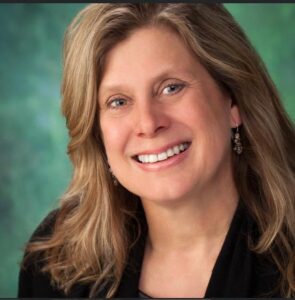
Elizabeth (Beth) Field, M.S. brings a lived experience perspective to all aspects of her work and life. Beth has been actively involved with family support initiatives for those with developmental disabilities and mental health challenges for over 20 years. In 2019, she formed LAND (Leadership Alliance for Neurodevelopmental Disabilities), an advocacy organization made up of those with lived experience, to meet the needs of those with intellectual or other developmental disabilities (I/DD) and their families, especially during times of transition. LAND is a program of the Mental Health Transformation Alliance. Beth is currently Family Co-Chair for the NC Collaborative for Children, Youth and Families. She is also the program director for Meet the Need NC, an NCCDD funded initiative to meet the service and support needs of the I/DD community in NC. Beth has a Master’s of Science degree from an executive program in Communications Management from the Newhouse School of Public Communications at Syracuse University, and 30+ years of strategic communications and marketing experience with public and private organizations.
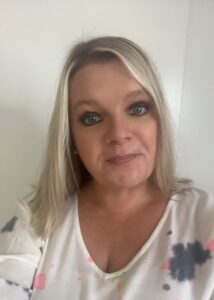
Stacy Morgan is the parent of an adoptive child and young adults with special needs and a consumer supporter/advocate with over 20 years. She focuses on opportunities to participate in the planning, development, and implementation of services for populations with special needs, especially in the arena of mental health and developmental disabilities. She is also the kinship caretaker of her 10-year-old cousin who experienced traumatic events and continues to navigate the mental health and foster care systems. Stacy has served as a consultant for various programs and organizations, facilitating partnerships between families and community stakeholders to develop family and consumer centered/driven and culturally competent initiatives, services, and policies for children, youth, and adults with special needs. She is the previous Associate Director of NC Families United. Currently, Stacy serves as the Executive Director of the Mental Health Transformation Alliance, a national 501c3, nonprofit organization and Coordinator of the Family and Youth Center of Excellence “Authentic Voices.” She also participates in multiple community councils and partnerships and serves as the Family Co-Chair for the NC Collaborative for Children, Youth and Families Policy & Research Workgroup.
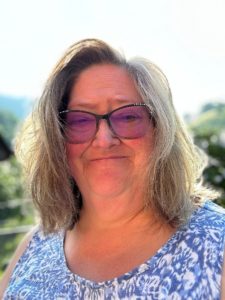
Diane Coffey, a parent of two adopted children with disabilities, including mental health issues, has faced many challenges. In her role as Family Engagement Consultant with the Parent to Parent, Family Support Network of the High Country, she has partnered with hundreds of families around the state of North Carolina to help them navigate systems. She also supports and partners with many agencies across the state. Diane is the acting family co-chair of the NC Collaborative for Children, Youth & Families School-Based Mental Health sub-committee. She is also on the Advisory Council of LAND, sits as Chair of the DPI Council on Educational Services for Exceptional Children and one of 24 on the Parent Engagement Committee for the Center for Safer Schools. When working/partnering at the state level she works hard to bring the family voice and build partnerships to improve all services children/youth and adults receive.
Register for February's Lunch & Learn Webinar!
Systemic Change for the I/DD Community Requires a Common Agenda
Join us on the third Tuesday of each month at noon to listen to discussions on new topics brought to you by thought leaders in the intellectual or other developmental disabilities (I/DD) community.
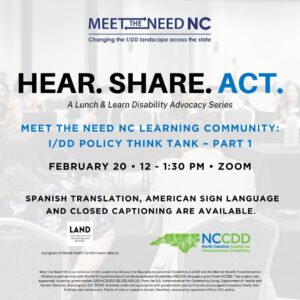 Our next Lunch & Learn will be on Tuesday, February 20, 2024, from 12 pm – 1:30 pm* when the topic will be Meet the Need NC Learning Community: Follow-up from the Fall I/DD Policy Think Tank (Part 1). *Please note that this month’s webinar will end at 1:30pm rather than 1:00pm.
Our next Lunch & Learn will be on Tuesday, February 20, 2024, from 12 pm – 1:30 pm* when the topic will be Meet the Need NC Learning Community: Follow-up from the Fall I/DD Policy Think Tank (Part 1). *Please note that this month’s webinar will end at 1:30pm rather than 1:00pm.
About the webinar: In November 2023, we brought together over 70 I/DD thought leaders representing 47 organizations for our first annual Policy Think Tank. We developed goals for our 2024 Work Plan with this diverse group of voices which included LME-MCOs, providers, nonprofits, universities, state agencies, and individuals with I/DD and their families.
Our Meet the Need NC Advisory Collaborative, that has been together for over two years, will be presenting the results from our Think Tank. We are inviting all those who attended our Fall Think Tank, and also anyone from our I/DD community who wants to attend. We will present our findings and recommendations for our collective goals to meet the service and support needs of the I/DD community in NC.
Everyone is invited to participate, and we will be asking for input on how we can join together as a Learning Community to refine and meet goals together. Ambitious? Yes! But so very necessary as we move toward systemic change for those with I/DD in our state.
Register here!
Throughout our monthly webinar series, Meet The Need NC aims to create a basic understanding of the unmet needs of those living with I/DD in North Carolina. For more information, including our 2024 webinar schedule, go to our Lunch & Learn Webinar Schedule & Registration web page.
LENS: Lived Experience Network Speaks

LENS, which stands for Lived Experience Network Speaks, is a blog provided by Meet The Need NC from our LENS Advisory Group. LENS includes individuals with intellectual and/or developmental disabilities (I/DD) experience, including people with I/DD, families, and caregivers with separate groups for those who speak English or Spanish.
We provide a space for them to share freely, but these opinions do not necessarily represent those of Meet The Need NC or all members of the LENS Advisory Group.
This month, you will read from two individuals with I/DD about their experiences during their school years and how they and their families worked together through the good and not-so-good times. The guest bloggers are Jonathan Ellis and Cheryl Powell.
Attending Public School with I/DD: My Challenges and Successes
By Jonathan Ellis
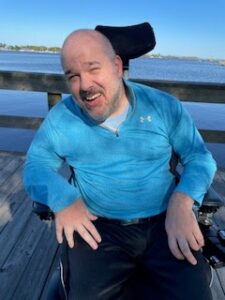
In 1978, I began my public schooling at Riverview Elementary school in Murfreesboro, North Carolina. During kindergarten and first grade, I was transported to school by cab because the county did not have access to buses equipped with lifts. In second grade, my parents were building our house, so my teachers would make sure that either I did my homework at school, or I did not have homework for that entire year. In third grade, I had multiple surgeries, but because I was so in love with school, my teacher had a pallet on the floor, and I just laid there and listened. Before I was eight years old, I was in a stroller and a manual wheelchair, and my classmates would fight over who would push me to the lunchroom. One kid accidentally made me fall out of my chair because before I could tell him to tilt my chair, he pushed me straight forward out of the building.
While dealing with all this in the meantime, there were the meetings with my mother, the director of exceptional children and the principal. My mother dealt with my individualized education plan (IEP) year-after-year.
By fourth and fifth grades, things had smoothed out a little. At times, I wished I could be in special education classes, but my parents fought to have me in a mainstream classroom setting. Looking back, I am very appreciative of my parents’ efforts, as it helped to put me on the path to where I am today. I can recall times when the principal would see my mother pull up and tell everyone to just give in to her demands so she would get off his campus. That proves to me how hard my mother fought to give me the best education possible.
Like most children, by middle school, my love for school dwindled so much that some days I faked illness to get out of going. Considering how sick I was so often, people usually believed me. One time though, my principal stopped me from going to the secretary to call my mother. She made me return to class telling me I could make it a couple more hours. That lasted a half hour, before I managed to persuade her to let me call my mother to come get me.
In eighth grade, shop class didn’t have a ramp, so classmates lifted me through the doorway. I waited all year hoping the teacher would give us a ramp building class project, but it never happened. We had a fire in the boiler room and my friends had to carry me out the doorway. That fire though, still never lit a fire under my shop teacher as a sign that a ramp may prove helpful.
In ninth grade I was in Murfreesboro High School, but in tenth grade, we merged with Hertford County High School. Most teachers gave me a five-minute head start because I used the elevator to get to my next class. I also got to leave school ten minutes early because it took longer to load the bus when students with disabilities rode it.
In high school, I loved sports. One of the cheerleader’s fathers took me to basketball games. When my mother came to get me one night, the whole gym heard me yelling at her because I wanted to stay until the end of the game like all my friends.
At my graduation, my classmates proved how impressed they were with my perseverance. After I spoke with my principal and informed her how much I wanted to cross the stage, a ramp was built, and I received a standing ovation from everyone in the gym.
Three weeks after graduation, I went to summer school at St. Andrews University in Laurinburg, North Carolina, where I had to take two classes. I did this as a trial run for college classes in the fall, which was required for people with disabilities at the time. After that first short semester, I returned home. After scoring a “B” and a “C” in those classes I received an acceptance letter to return for fall semester. It still took me a full year to convince my parents to allow me to return to St. Andrews to further my education. They were hoping my summer away would teach me that I did not want to return, but instead it just fueled my hunger for more. Five years after returning, I graduated with my bachelor’s in arts in Communications with emphasis in public relations.
Today, I work as a certified consultant for Scentsy, a direct selling company. I am also actively involved in self-advocacy for people with disabilities.
About the author: Jonathan S. Ellis’ hometown is Murfreesboro, NC. He achieved a bachelor’s degree from St. Andrews University in 1996. He has worked for Easter Seals and UCP in Wilmington. He’s currently a certified consultant for Scentsy and is an active self-advocate. Jon’s hobbies include music, volunteering at nonprofit animal shelters, volunteering with nonprofits to help raise money, and visiting the beach.
How Having Family Support Leads to a Successful Outcome for People with Disabilities in School
By Cheryl Powell

My name is Cheryl Powell and I have cerebral palsy, a developmental disability. I was born with it due to the fact that my mom was a diabetic.
My being disabled didn’t mean that my parents or my family saw that as some sort of excuse for me not to do well in school or do well in life. My mother and my father expected me to do well and they expected me to do my homework and to go to college someday.
So I went to school and I did attend what they consider a “special class” or a “special needs class.” I’m not sure whether that was the name of it at the time but I only attended one of those classes. The rest of my classes were mainstream classes. Mainstream means that they were classes in which people who did not have disabilities were being taught. I was one of around between three and five students that had a disability in the classes.
As I was growing up, I didn’t want to go to school. I didn’t like school. I wanted to stay home and just sleep and watch TV and be with my mom. That’s all I wanted for a lot of years. I had chronic absenteeism. However, that all changed in the 10th grade. My mom had unfortunately passed away when I was 12 years old and that left my daddy and my granddaddy and my uncle to raise me on their own.
My dad chose to get remarried to a lady who had three children when I was 16 years old. I was an only child my whole life up to that point and it was extremely hard for me once he got remarried. I had no desire to stay at home. I wanted to get away from the house so I started going to school and I started keeping up with my homework and my assignments and I was doing well. I started getting on the honor roll and getting good grades. I continued to do well through graduation. I graduated with a high school diploma, not with a certificate of attendance which for some individuals with disabilities that is appropriate. (Editor’s note: A certificate of attendance is no longer offered by the NC Department of Public Instruction and is not supported as best practice under the Individuals with Disabilities Education Act (IDEA) 2004. For more information: https://www.dpi.nc.gov/districts-schools/high-school-graduation-requirements.)
I felt that the best opportunity for me was to go to community college, and therefore, I went to Cape Fear Community College and stayed for two years and then transferred to the University of North Carolina at Wilmington. While there, I studied social work and earned my bachelor’s degree in social work in 2003. Following that it took me about two years to find a job.
I started work as a direct support professional for Easter Seals UCP North Carolina/Virginia for seven years. Following that I took around 10 years off because I had made too much money and that caused me to lose my benefits. So, I basically lost my benefits because I chose to live the life I wanted to live…my own life. Not a life dictated to me by the United States government and the state of North Carolina.
This is something that a lot of us face as we live our lives with disabilities. I choose to now be a self-advocate. I applied to the North Carolina Council on Developmental Disabilities and was appointed by Governor Pat McCrory. Once beginning my work with the NCCDD it wasn’t long before I was voted in as vice chair twice and I served as a member for eight years.
Serving on the NCCDD has led to more success for me. I’m honored by the privilege of getting to know people within the disability community both individuals and professionals. I’m working again and working to maintain benefits and things of that nature. I’m still able to work by working from home. I currently work/serve as co-chair of the Meet the Need NC initiative called LENS (Lived Experience Network Speaks). I share this responsibility with a very capable and very smart parent by the name of Diane Coffey and the two of us work very well together and I enjoy what I’m doing. Also, I’m happy to say that I have a small part in the Work Together North Carolina initiative, where I provide consultation on things like their website.
I’m very happy with where I’ve landed so to speak. Back in school I was not bullied. However, there were a couple of incidents where kids were kind of rude. One girl when I was in 7th grade looked at me and said, “you’re pathetic!” I didn’t say anything to her. I was a bit of a loner. I would go to study hall so that when I got home at night I could spend my time watching TV and being with friends and I didn’t have homework to worry about because it was already done. I was around 18 and near graduation time, when I was contacted by Vocational Rehabilitation and through testing and meetings with them, I’m proud to say that they were able to fund my college education and basically got my degree for me paid for. My uncle took me to school everyday in college and that’s part of having that supportive family that is so crucial for success in my opinion.
About the author: Cheryl Powell was born and raised in Wilmington, NC, and graduated from UNC-Wilmington with a degree in social work in 2003. She worked as a Direct Support Professional for seven years for Easter Seals UCP. In 2015, she became a member of the North Carolina Council on Developmental Disabilities (NCCDD), and recently completed her eight-year term. She also served as chairperson of the NC Empowerment Network, a statewide self-advocacy group. She is a member of the following organizations: NACDD, DSP Workgroup, Work Together NC, LAND Advisory Council, Technical Advisory Group (TAG). Cheryl states that she wants to do everything that she can to support and advocate for others with disabilities. She has been married to her best friend Billy since 2012 and has a chihuahua named Annabelle who she adores.
Policy Updates and Other News
Policy Updates
New Report from NCDHHS and the Department of Commerce to Strengthen NC’s Caregiving Workforce: The North Carolina Department of Health and Human Services (NCDHHS) and the Department of Commerce just released a new report, which offers a roadmap of initiatives the state will take to strengthen and support its health care workforce. The report comes from the Caregiving Workforce Strategic Leadership Council, a group convened by Secretary Kinsley and NC Secretary of Commerce Machelle Baker Sanders of leaders from government agencies, educational institutions and other key organizations deeply engaged in health care.
Following the state’s greatest areas of need, the Council chose to focus on three professions: nursing, behavioral health and direct care. North Carolina faces significant shortages of all three professions.
Please help share the report and look for opportunities to engage with these Departments as the work begins. The report serves as a roadmap, but only with all of us working toward these shared goals, will we be able to make the progress that we all know is needed for North Carolina. For more information, read the official NCDHHS press release.
Recommendations for HCBS Worker Certification to the North Carolina Department of Health Benefits: Report from the NC Area Health Education Centers Program (AHEC) to investigate worker certification of direct care workers as a means of addressing the recruitment and retention of home- and community-based care workers. Read the report.
Questions and Answers about Medicaid Expansion: North Carolina is providing health care coverage to more people through Medicaid. Read: Quick Facts about North Carolina’s Medicaid Expansion
NC Medicaid Releases LME/MCO Consolidation Fact Sheets: Read the fact sheets for members and recipients, available in both English and Spanish.
NCDHHS Announces Details of New Children and Families Specialty Health Plan: NCDHHS released the revised Children and Families Specialty Plan Policy Paper on January 16, 2024. The original North Carolina’s Specialized Foster Care Plan was released in February 2021, requesting input from those who support these populations and other interested stakeholders.
What is Care Management? Information about Tailored Care Management from The Arc of North Carolina.
Rethinking Guardianship: The North Carolina Council on Developmental Disabilities (NCCDD) recently shared an update on guardianship in NC: New Law Creates Long-term Change in North Carolina’s Guardianship System.
Other News
Event Alert: School of Social Work Legacy Speakers Series 2024: Thriving with Intellectual and Developmental Disabilities Across the Lifespan
- When: March 8, 2024
- Where: Friday Conference Center, 100 Friday Center Drive, Chapel Hill, NC 27517
- Description: Join the UNC School of Social Work for a thought-provoking celebration of National Developmental Disability Awareness Month during our 3rd annual Legacy Speakers Series. This year, we are focusing on “Thriving with I/DD Across the Lifespan”. Spend the day with social work scholars and community leaders with lived experience, exploring ways to empower people with intellectual and developmental disabilities (I/DD) and their families to exercise choice and self-determination more fully throughout life. We’re shedding light on the challenges faced by individuals with I/DD and highlighting collaborative practices that build more equitable and inclusive communities. How are we ensuring our legacy creates a space where people with unique perspectives and experiences can thrive?
- Learn more including how to register
MTN NC wishes you a Happy New Year!
In This New Year – A Poem by Rosie Molinary (2024)

May we be hungry enough to learn things and humble enough to see things from a new perspective.
May we be wild enough to conceive new possibilities.
May we find the person, the people who are softest with our hearts and lean into those relationships. May we be the softest place to land for others.
May there be hugs that leave imprints, kisses that light fires, and love – of all types – that knows no bounds.
May we be soft, sweet, and fearless enough to deepen the love that envelops this world, giving all of us the medicine we so desperately need.
May we resource ourselves in such a generous way that each time we think we have run out of grace, love, energy and patience, we find that, just past that next minute, there is more of what we need waiting for us.
May we create ease and prioritize peace for ourselves and others.
May we be liberated. May we have abundance. May we be empowered and inspired enough to create abundance and liberation for all.
May we do what we can, may we do what we must, to heal this world.
May we create the world and the future every one of us deserves.
Find out more information about Rosie Molinary, an author, committed activist and founder of Circle de Luz at https://rosiemolinary.com/. You can also find her on Instagram (@rosiemolinary) and X (@rosiemolinary).
Let’s get social! Stay in touch with us on Facebook, Instagram and more!
Want to stay informed about issues that are important to you and your community? Follow us and subscribe to our newsletter! Here’s where to find us:
- Follow us on social media on Facebook and Instagram.
- View our Lunch & Learn webinar recordings and other video clips on our YouTube channel.
- Listen to our podcast, The Waiting Room, hosted by Kenneth Kelty.
- Visit our website for updates, resources and links to other helpful websites.
- Join our email list to receive upcoming webinar registration information and our monthly newsletter.
Most importantly … share this information! Encourage others to subscribe to our newsletter and follow us on social media so they, too, can be part of Meet The Need’s vision and mission to change the I/DD landscape across North Carolina through a common agenda. Together, we can make it happen!
